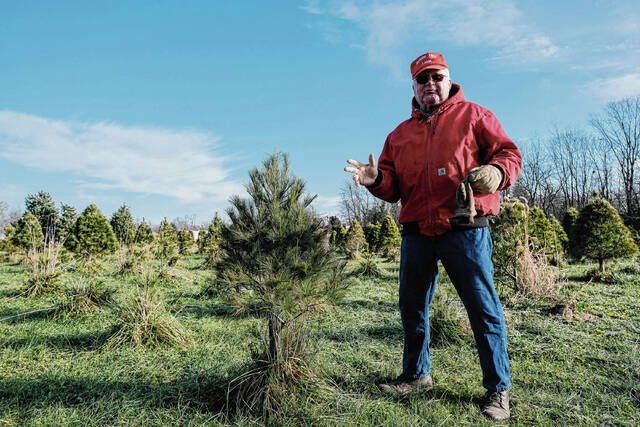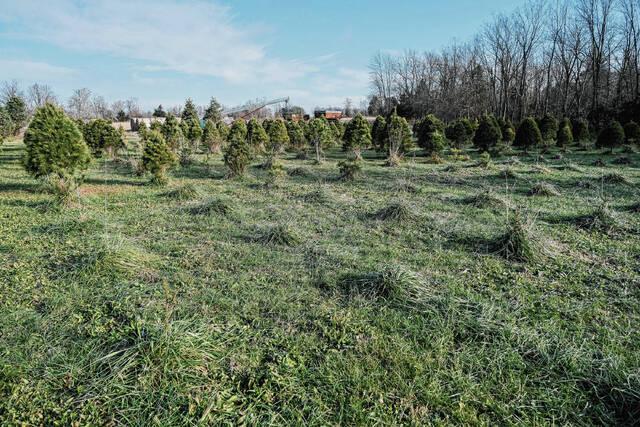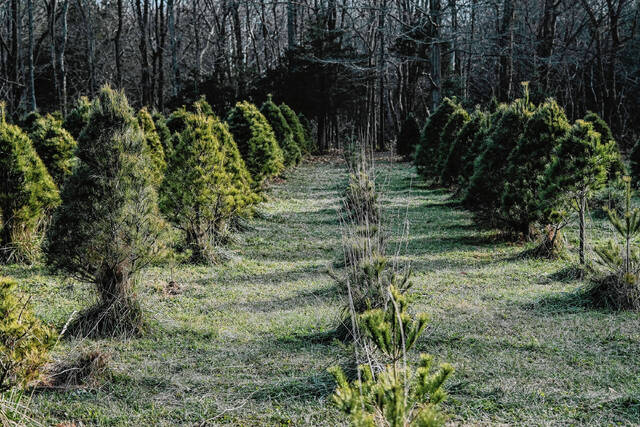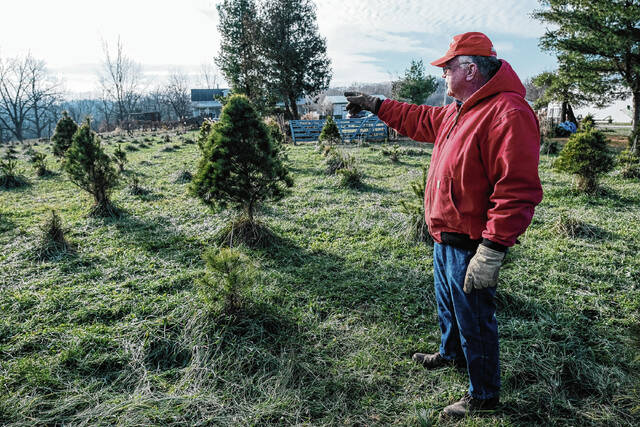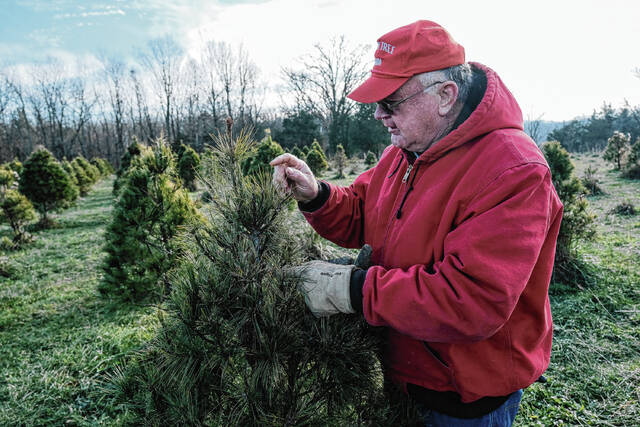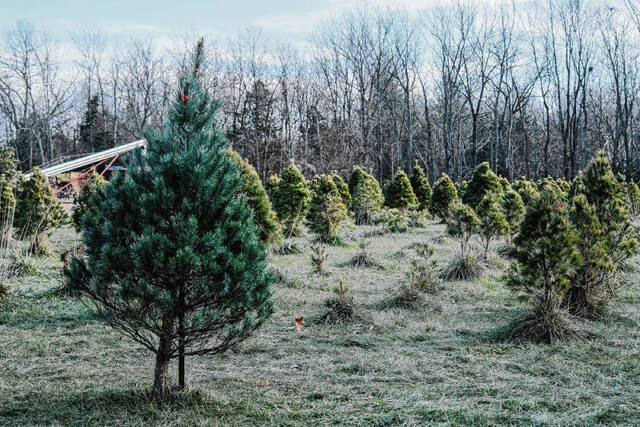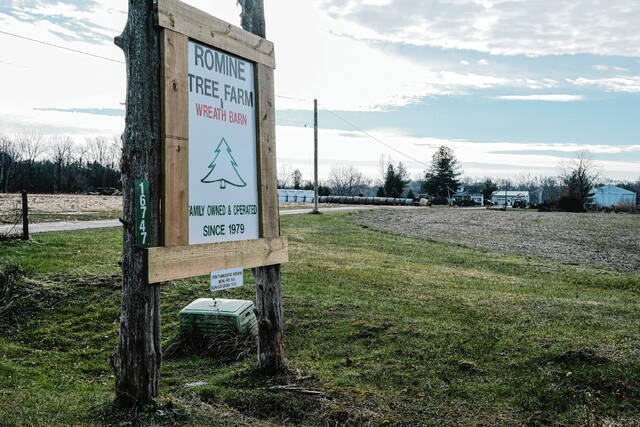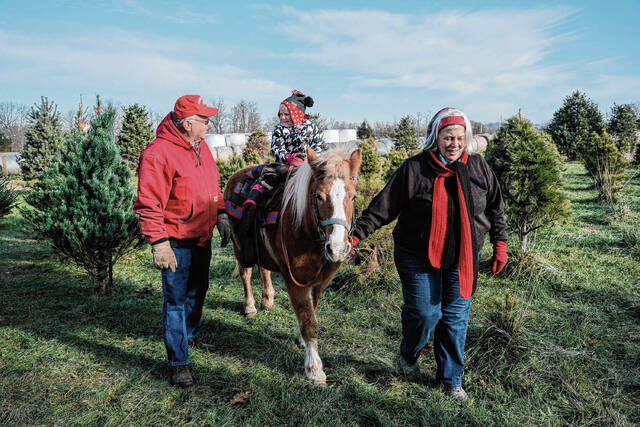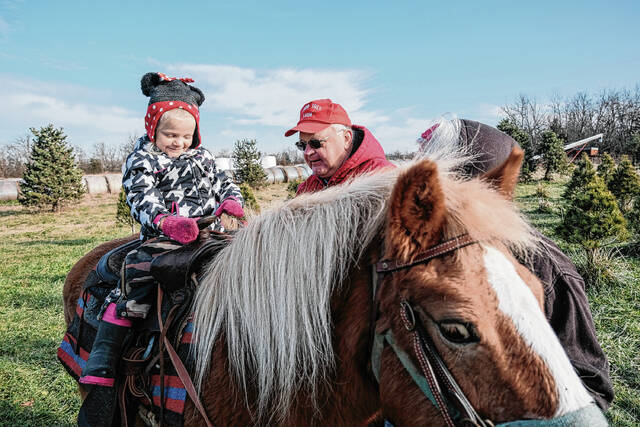
Mike Wolanin | The Republic
Mark Romine situates his granddaughter Ada Rutan on a horse named Buttercup to walk her around Romine Tree Farm on Wednesday in Hope.
Real or artificial, it’s been a bit difficult lately to find a quality Christmas tree.
It hasn’t always been that way. Just a few years ago, at least three prominent tree farms operated in Bartholomew County.
But one of them — Hackman Tree Farm at 12076 W. County Road 50S — didn’t open this holiday season. Diana Hackman says she and her husband, Roger, decided to retire from the Christmas tree business at the end of last year.
“The pandemic kind of booted us along that way, and we just haven’t reopened,” Diana Hackman said.
Meanwhile, the Tower Family Christmas Tree Farm on West Lowell Road closed for the season immediately after their busiest day of the year — the Saturday after Thanksgiving.
“Our suppliers only gave us two-thirds of what we ordered,” co-owner Cathy Tower explained. “And we had to recall about 100 trees because they were too dry and their needles were falling off. We ended up having a very short season.”
But if you are in the market, there is one tree farm that, at last check, was still open: the 35-year-old Romine Tree Farm, located at 16747 Huffer Road, Hope.
The farm still had about 45 cut trees to sell early this week, owners Mark and Carol Romine said.
While there were between 20 and 30 white pines available for customers who prefer to cut their own tree, some of that inventory is about 4- to 5-feet-tall and may be smaller than some families prefer, Carol Romine said.
The challenges
Although COVID-19 has certainly impacted Christmas tree sales, it differs from place to place, Tower said.
For example, many people wanted real trees last year because it gave them a reason to get out of the house at the height of the pandemic, she said.
“As a result, Christmas tree farms oversold, which left a bit of a shortage since you should always keep some trees for the next year,” Tower said. Along with only receiving a partial order with many in poor condition those were the reasons why Tower closed a few days after Thanksgiving.
Another adverse reason was last summer’s heat and drought that plagued the Pacific Northwest. It’s a region that is the largest producer of live trees in the U.S., with about 5 million cut annually that account for nearly 25% of the national supply.
The hot and dry weather in the Pacific Northwest reduced that stock by about 10%, according to Doug Hundley, spokesman for the National Christmas Tree Association.
Another problem is that it takes several years for a Christmas tree to grow to full size. During the financial crisis of 2008, many growers didn’t have the funding to plant a lot of trees. Although that didn’t create a shortage in itself, it did reduce bargain prices by keeping supply and demand at nearly the same level, Hundley said.
As a result, prices for live trees have been about 5% to 10% higher than last year, he added.
Due to its blue-green needles with silvery undersides, the Fraser Fir is one of the most popular Christmas trees. The stiff branches hold ornaments well, the tree itself gives off a pleasant aroma, and the needle retention is considered excellent.
The problem is that there are few, if any, Fraser Firs left that haven’t already been bought, Tower said.
“We’ve been trying to get some from somewhere else, and they just aren’t available,’ she said.
Limited choices
Those inclined to buy an artificial tree this year can expect to pay 10% to 30% more than last year, according to Jami Warner, executive director of the American Christmas Tree Association, a trade group representing the artificial tree industry.
Supplies of artificial trees, largely coming from China, are being affected by the same shipping and labor problems plaguing many industries Warner said.
It’s not easy to operate a Christmas tree farm, and Carol Romine said she and her husband had once considered closing their operation. But instead, they simply scaled back their operation to a more manageable level, she said.
“Folks have been coming here for generations, and many like to bring their families,’ Carol Romine said. “We like seeing people at Christmastime, and when they come here, they are always happy.”
In addition to trees, the Romines also sell wreaths and grave blankets. On the weekends, there’s an effort to entire families to visit the farm by providing children with hayrides and horseback rides, Mark Romine said.

